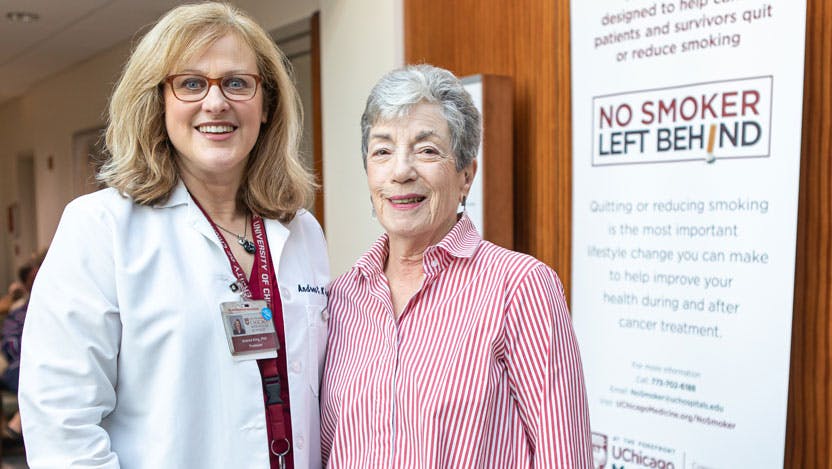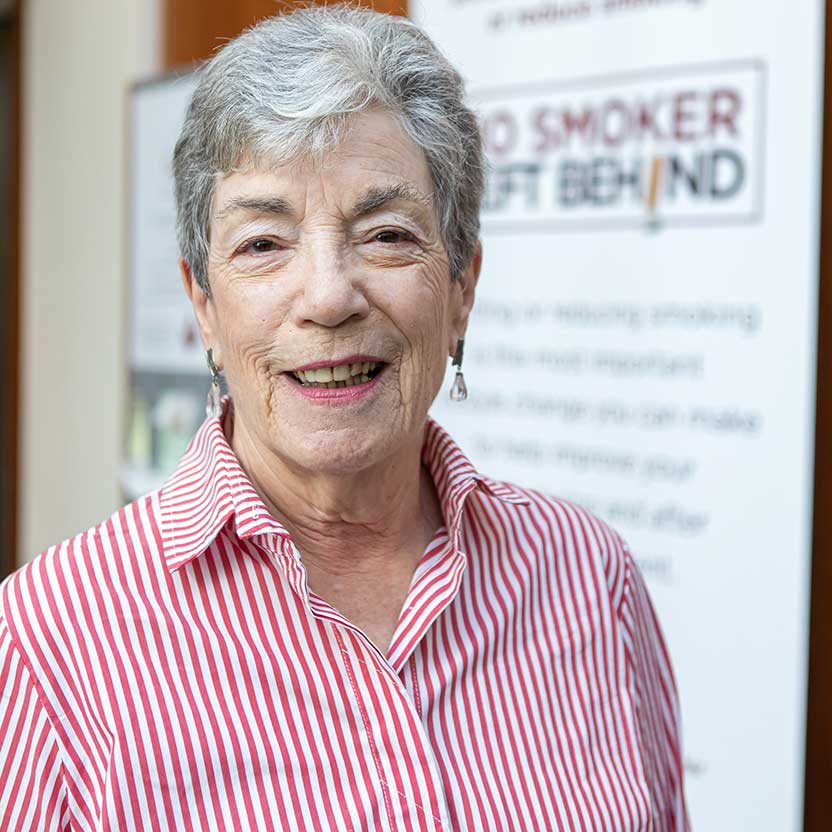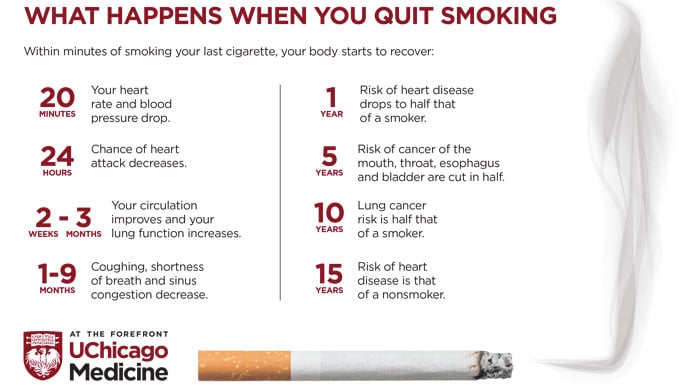How to quit smoking after 60 years

Mary Baim started smoking as a teenager in the 1950s and continued to smoke for the next 60 years. In the early days, she sometimes went through a pack and a half of cigarettes a day.
She even smoked when treated for breast cancer at the University of Chicago Medicine. Her raspy cough didn't deter her.
"I once tried to quit, but it wasn’t a serious attempt, because I was sure I couldn’t do it," she said.
When Baim was in her mid-70s, her dear friend and longtime "smoking partner" died five weeks after being diagnosed with lung cancer.
And Baim’s grandchildren were nearing the age where they could smell cigarette smoke on her clothes and ask questions.
She neither wanted to lie nor be hypocritical, the driving forces behind her decision to quit.
She did it at age 77 in 2019, with help from Courage to Quit, a smoking cessation program at UChicago Medicine. Baim tapered down to a few cigarettes a day and then stopped completely.
She hasn’t had a cigarette in almost four years and feels great.
"I’m incredibly proud of her," said clinical social worker Ethan Israelsohn, LCSW, who led some of the Courage to Quit groups that Baim attended. "She got the right help at the time when she had the determination to quit."
Baim started with a visit to her primary care doctor, Mindy Schwartz, MD, who ordered a low-dose CT scan, a lung cancer screening test recommended for some longtime, heavy smokers. Schwartz also referred Baim to the Courage to Quit program.
We teach people important skills and help them stay motivated and encourage them to keep working on intermediate goals of cutting back, or doing anything they can do to start making a change.
Courage to Quit was developed by smoking cessation expert Andrea King, PhD, of UChicago’s Department of Psychiatry & Behavioral Neuroscience, in partnership with the Respiratory Health Association (RHA). The join-anytime, go-when-you-can support group combines counseling with evidence-based medications. Virtual meetings are held several days a week for patients' convenience.
Through funding from the RHA, the Chicago Department of Public Health and the American Lung Association, patients who attend can receive no-cost nicotine replacement patches, lozenges and gum for 10 weeks or more. They also can share their triumphs and struggles at the meetings, while encouraging and learning from each other and the group leaders.
"It was one of the best experiences I’ve ever had," Baim said. "I felt included from the minute I walked in. They don’t talk down to you. They meet you where you are and encourage you to stay with it."
Weeks after quitting, Baim’s cough stopped. She invested the money once spent on cigarettes in a gym membership, which is helping her to shed weight gained while quitting.
"It saves money, but what I feel like I’ve gotten back the most is time. It feels like hours. I’m no longer stopping what I’m doing to go outside and smoke," said Baim, who turns 82 in January 2023.

Since Courage to Quit began at UChicago Medicine almost seven years ago, 900 people have enrolled. Most are over 55 and, like Baim, started smoking as teens or young adults. All have chronic health issues impacted by smoking, such as cancer, diabetes, chronic obstructive pulmonary disorder (COPD) or cardiovascular disease.
It’s especially important for cancer patients to quit smoking, because the 7,000 chemicals in a lit cigarette reduce the effectiveness of radiation and chemotherapy treatments. Smoking also increases the odds of cancer recurrence.
That’s why the UChicago Medicine Comprehensive Cancer Center received NCI Moonshot funding to launch a smoking cessation program specifically for cancer patients called No Smoker Left Behind. The program offers medication support, individual and group counseling, and text and phone support through the National Cancer Institute’s SmokeFreeTXT and the Illinois Tobacco Quitline.
The program is aligned with the cancer center's Office of Community Engagement and Cancer Health Equity.
Anne Roupas, a tobacco treatment specialist with No Smoker Left Behind, said it can be harder for older smokers to quit because they’ve been addicted longer to nicotine. The biggest obstacles to quitting are stress, increased anxiety and depression, Roupas added. The combination of counseling with pharmaceuticals can combat the nicotine addiction.
Like Baim, many in the group are motivated to give up smoking for their children or grandchildren. King regularly asks the people in the group to raise their hands if they want their kids or grandkids to smoke. No one ever does.
"They look at me horrified when I ask that," King said. "But I do it for a reason."
No Smoker Left Behind operates out of all of UChicago Medicine’s cancer clinics. Cancer patients who smoke are contacted by phone and offered smoking cessation resources. They can choose the option that is the best fit from them.
New data shows smoking has reached an all-time low in the U.S., but 12.5% of the population (or one in 8 adults) still smokes cigarettes, according to the Centers for Disease Control and Prevention (CDC).
Also, 16 million Americans live with a disease caused by smoking and, on average, smokers die 10 years earlier than nonsmokers, the CDC reports. Smoking cessation can help the treatment for every illness, King said.
"It’s never too late for anyone," King added. "People don’t magically know how to do this. We teach people important skills and help them stay motivated and encourage them to keep working on intermediate goals of cutting back, or doing anything they can do to start making a change."
Smoking Cessation Program
Everyone’s journey to quit smoking is different, but you don’t have to do it alone. Courage to Quit® (CTQ), a group-based approach to smoking cessation, helps patients like you overcome tobacco addiction and quit smoking for good.
Learn more about our smoking cessation programs.
